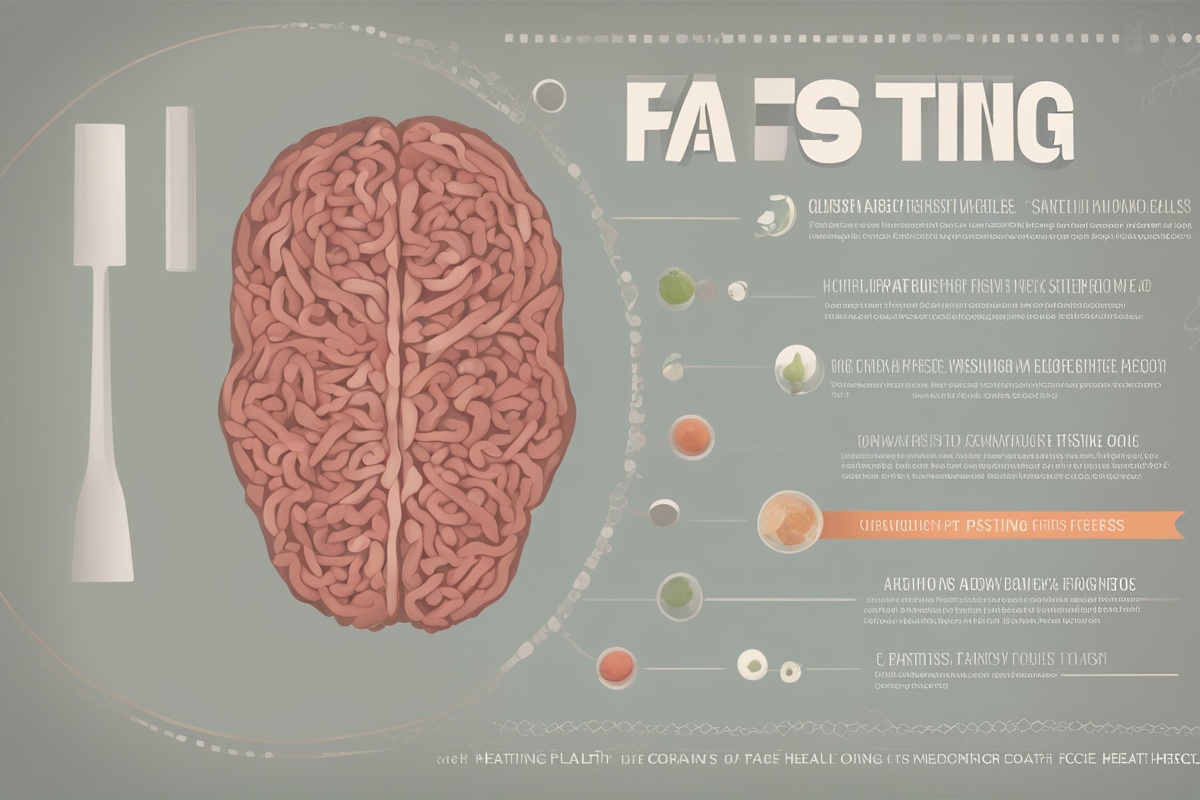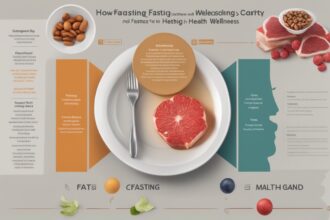Hey there, health enthusiasts! If you’ve ever felt like your brain is stuck in a fog—struggling to focus, remember details, or make decisions—you’re not alone. In our fast-paced world, mental clarity often feels like a distant dream. But what if I told you that a practice as simple as fasting could be the key to unlocking a sharper, more focused mind? Today, we’re diving deep into the cognitive fasting benefits and how this ancient practice can transform your mental game. Whether you’re new to fasting or a seasoned pro, stick with me as we explore the science, practical tips, and real-world ways to harness fasting for brain health.
What Are Cognitive Fasting Benefits?
Let’s start with the basics. Cognitive fasting benefits refer to the positive effects that fasting—intentionally abstaining from food for a set period—can have on your brain function. This isn’t just about weight loss or physical health; fasting has been shown to enhance mental clarity, improve focus, and even support long-term brain health. From intermittent fasting (IF) to longer water fasts, the idea is that giving your digestive system a break allows your body—and brain—to redirect energy toward repair and optimization. Studies suggest that fasting triggers processes like autophagy, where cells clean out damaged components, and this can have a direct impact on cognitive performance (Mattson et al., 2018). So, if you’ve ever wondered why some people swear by fasting for productivity, this is where the magic begins.
How Fasting Boosts Mental Clarity
One of the most talked-about cognitive fasting benefits is improved mental clarity. When you fast, your body shifts from using glucose as its primary fuel to producing ketones—a type of energy source derived from fat. This metabolic switch, often called ketosis, doesn’t just power your body; it also fuels your brain in a way that can enhance focus and reduce brain fog. Research indicates that ketones are a more efficient energy source for the brain, potentially leading to sharper thinking and better decision-making (Veech, 2014). Beyond ketosis, fasting also reduces inflammation in the body, which is a known contributor to cognitive decline. So, when you’re fasting, you’re not just resting your gut—you’re giving your brain a chance to reset and thrive.
The Science Behind Fasting and Brain Health
Let’s get nerdy for a moment and unpack the science behind these fasting cognitive advantages. Fasting has been shown to increase the production of brain-derived neurotrophic factor (BDNF), a protein that supports the growth and survival of neurons. Higher BDNF levels are linked to improved memory, learning, and overall brain plasticity (Marosi & Mattson, 2014). Additionally, fasting promotes autophagy, a cellular cleanup process that removes damaged proteins and toxins from brain cells, potentially lowering the risk of neurodegenerative diseases like Alzheimer’s (Rubinsztein et al., 2015). These mechanisms aren’t just theories; they’re backed by studies showing that fasting can protect against age-related cognitive decline. It’s like giving your brain a detox while building resilience for the future.
Fasting for Focus: Practical Tips to Get Started
Convinced about the mental benefits of fasting? Great! Now let’s talk about how to incorporate fasting into your life to reap these cognitive rewards. The beauty of fasting is that it’s flexible—you don’t need to jump into a multi-day fast right away. Here are some actionable tips to ease into it while keeping your brain health in mind:
- Start with Intermittent Fasting (IF): Try a 16:8 schedule, where you fast for 16 hours and eat during an 8-hour window. This is beginner-friendly and still offers cognitive fasting benefits.
- Stay Hydrated: Drink plenty of water during fasting periods to avoid dehydration, which can worsen brain fog.
- Break Your Fast Wisely: Opt for nutrient-dense foods like nuts, avocados, or leafy greens to support brain function after fasting.
- Listen to Your Body: If you feel dizzy or overly fatigued, scale back. Fasting should enhance, not drain, your mental energy.
Remember, consistency is key. Even a few days of fasting each week can start to show results in your focus and clarity over time.
Potential Challenges and How to Overcome Them
Let’s be real—fasting isn’t always a walk in the park, especially when you’re aiming for those brain health fasting perks. Hunger pangs, irritability, and low energy can throw a wrench in your plans, especially in the beginning. But don’t worry; these hurdles are manageable with the right mindset and strategies. Here’s how to tackle common challenges:
- Hunger Cravings: Distract yourself with light activities like walking or journaling. Herbal teas can also help curb appetite.
- Initial Fatigue: Your body may take time to adapt to ketosis. Give yourself a few days, and ensure you’re getting enough rest.
- Social Pressures: Eating is often a social activity. Plan fasting windows around social events, or explain your goals to friends for support.
- Overdoing It: Avoid jumping into extended fasts without preparation. Build up gradually to prevent stress on your system.
- Mental Slumps: If focus dips initially, pair fasting with mindfulness practices like meditation to stay grounded.
By anticipating these challenges, you can stay committed to fasting and enjoy its cognitive enhancement through fasting without unnecessary frustration.
Long-Term Cognitive Fasting Benefits for Brain Health
Beyond the immediate perks like mental clarity and focus, fasting offers long-term benefits for brain health that are hard to ignore. Regular fasting may help protect against cognitive decline as we age, thanks to its role in reducing oxidative stress and inflammation—two major culprits in brain aging (Longo & Mattson, 2014). Some studies even suggest that fasting-mimicking diets could lower the risk of conditions like Parkinson’s and Alzheimer’s by supporting neural repair mechanisms (Brandhorst et al., 2015). While more research is needed, the potential of fasting as a tool for lifelong brain health is incredibly promising. Imagine not just feeling sharper today, but also safeguarding your mind for decades to come—that’s the power of integrating fasting into your lifestyle.
So, where does this leave us? The cognitive fasting benefits are more than just a trendy health claim—they’re grounded in science and accessible to anyone willing to give fasting a try. From boosting mental clarity and focus to supporting long-term brain health, fasting offers a unique way to optimize how we think and feel. Whether you’re looking to crush your to-do list or simply cut through the mental clutter, fasting could be your secret weapon. Start small, stay consistent, and listen to your body as you experiment with this powerful practice. Here’s to clearer minds and brighter days ahead—let’s fast our way to better brain health together!
References
- Brandhorst, S., Choi, I. Y., Wei, M., Cheng, C. W., Sedrakyan, S., Navarrete, G., … & Longo, V. D. (2015). A periodic diet that mimics fasting promotes multi-system regeneration, enhanced cognitive performance, and healthspan. Cell Metabolism, 22(1), 86-99.
- Longo, V. D., & Mattson, M. P. (2014). Fasting: Molecular mechanisms and clinical applications. Cell Metabolism, 19(2), 181-192.
- Marosi, K., & Mattson, M. P. (2014). BDNF mediates adaptive brain and body responses to energetic challenges. Trends in Endocrinology & Metabolism, 25(2), 89-98.
- Mattson, M. P., Moehl, K., Ghena, N., Schmaedick, M., & Cheng, A. (2018). Intermittent metabolic switching, neuroplasticity and brain health. Nature Reviews Neuroscience, 19(2), 63-80.
- Rubinsztein, D. C., Mariño, G., & Kroemer, G. (2015). Autophagy and aging. Cell, 146(5), 682-695.
- Veech, R. L. (2014). Ketone ester effects on metabolism and transcription. Journal of Lipid Research, 55(10), 2004-2006.






